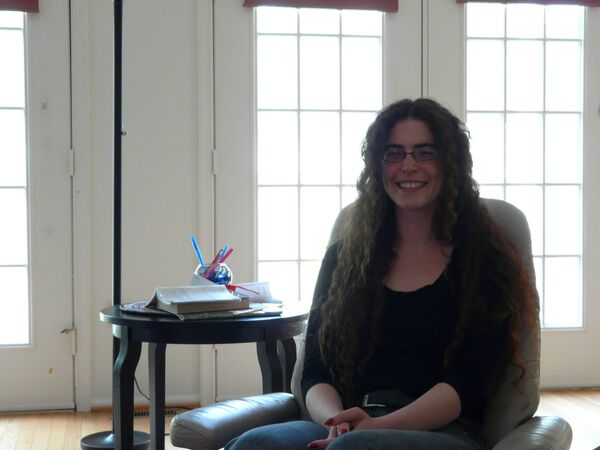I don’t know about other foreigners, but I’m always terrified of going to get a haircut in Russia – it can be hard enough to get across what you want to a hairdresser in your native language, without the additional trouble of the language barrier thrown in.
But if you are heading out to get your hair cut, you’ll want to use the verb постричься: Я понял, что пора уже побриться и постричься, когда на остановке ко мне подошел бомж и сказал: «Брат, угости сигаретой!» (I realized it was time get a haircut and shave when a bum came up to me at the bus stop and said: “Got a smoke, bro?”)
Moving beyond simply not looking like a bum, there are of course an enormous variety of hairstyles, причёски, and haircuts, стрижки, to choose from. One thing that women, at least, often need to discuss with their hairdresser is layers: Ступеньки можно начать делать от скул, а если волосы длинные – то и от уровня подбородка. (Your layers can start at your cheekbones, or at your chin if you have longer hair.) Ступеньки seem like a more imaginative word for the style, meaning steps on a staircase.
You can also get highlights, мелирование, in your hair. If you’re looking for chunky highlights, you can ask for крупные пряди (прядь is a lock or strand of hair) or мелко окрашенные пряди for thinner highlights.
Specific, well-known styles are referred to as стрижка каре, for example (a bob), or стрижка паж (pageboy). You’ll also hear people using “под” in hairstyle names. For example, many young children have suffered the indignity of getting haircuts in the kitchen from their mothers – стрижка под горшок (bowl cut.)
This “под” model is somewhat colloquial, especially in the expression косить под кого-то, to copy someone, or try to look/ act like someone. Here’s Pelevin, from Generation P: Когда-то он … сильно косил под Маяковского носил желтый свитер и писал эпатирующие стихи. (At one time he was doing his best to imitate Mayakovsky, wearing a yellow sweater and writing provocative poems.)
As for hair, you can use it as well to talk about a style that looks like someone else’s. For example, the hairstyle worn by Jennifer Aniston’s character Rachel on the sitcom “Friends” in the mid-90s became insanely popular, with people requesting “the Rachel haircut” at their local hair salons. If you want, for some reason, to do the same, you can say you want to постричься под Рейчел.
Men generally have an easier time of it; they can always go with a basic crew cut (стрижка ёжик, obviously for the hedgehog resemblance), or just shave it off entirely: Сторонники президента Венесуэлы Уго Чавеса публично побрились наголо в знак солидарности со своим лидером, облысевшим в связи с химиотерапией. (Supporters of Venezuelan President Hugo Chavez publicly shaved their heads in a show of solidarity with their leader, who has lost his hair due to chemotherapy.)
More “alternative” hairstyles have been showing up in Moscow in recent years. I’ve definitely seen more dreadlocks, although most of them are искусственные дреды. Speaking of fake hair, there’s also been a boom in hair extensions, наращивание волос.
One of the most visible of subculture hairstyles is the Mohawk, named after the Native American tribe. Interestingly, different countries have picked different tribes to describe this style, with the British opting for Mohican, and the Russians for ирокез (Iroquois); it makes a certain amount of sense, as the Mohawk belonged to the Iroquois League, but the different selections are still mysterious. In the late Soviet era, those whose appearance aligned them with a subculture group were referred to as неформалы, and you can still run into this word in conversation. It is not derived, as you might think, from someone dressing informally/ too casually, but from subcultures being designated as неформальные (marginal) youth groups, as opposed to the formal youth groups approved by the state.
Sadly, I’ve not been able to discover any Russian phrase that corresponds to one of the most popular hairstyles here, the mullet, so I’ll be happy to hear from anyone who has. The best I can offer is a description: спереди и с боков – коротко, сзади – длинно (short in the front and on the sides and long in the back. Or, as we like to say, business in front, party in the back. I applied to some Russian translators for suggestions, and they came up with a pretty great one: спереди будни (weekday) – сзади выходные.
The views expressed in this article are the author’s and may not necessarily represent those of RIA Novosti.
The Russian Tongue: What drives Russians round the bend
The Russian Tongue: Bookworms and bestsellers
The Russian Tongue: Baby talk and Russian gangsters
The Russian Tongue: Werewolves in epaulettes (and other bloodsuckers)
The Russian Tongue: Is there a doctorate in the house?
The Russian Tongue: Down ‘n’ dirty in the springtime
The Russian Tongue: How to lose friends and annoy people
The Russian Tongue: When sorry is the hardest word
The Russian Tongue: Minding your Russian Ps and Qs
The Russian Tongue: Bombing your way around Moscow
The Russian Tongue: Making merry with Father Frost
The Russian Tongue: The big freeze
The Russian Tongue: Talking Tolstoy
The Russian Tongue: Let me hear your body talk
The Russian Tongue: There is nothing like a dame
The Russian Tongue: Babes and babushkas
*
Learning Russian but finding the lessons too formal? In her entertaining column The Russian Tongue, Sara Buzadzhi gives practical informal tips on everything from dealing with traffic cops to flirting in the grocery store. Sara’s columns are published with permission of www.themoscownews.com, where they appear every two weeks.
Sara Buzadzhi is an English teacher and translator in Moscow.



